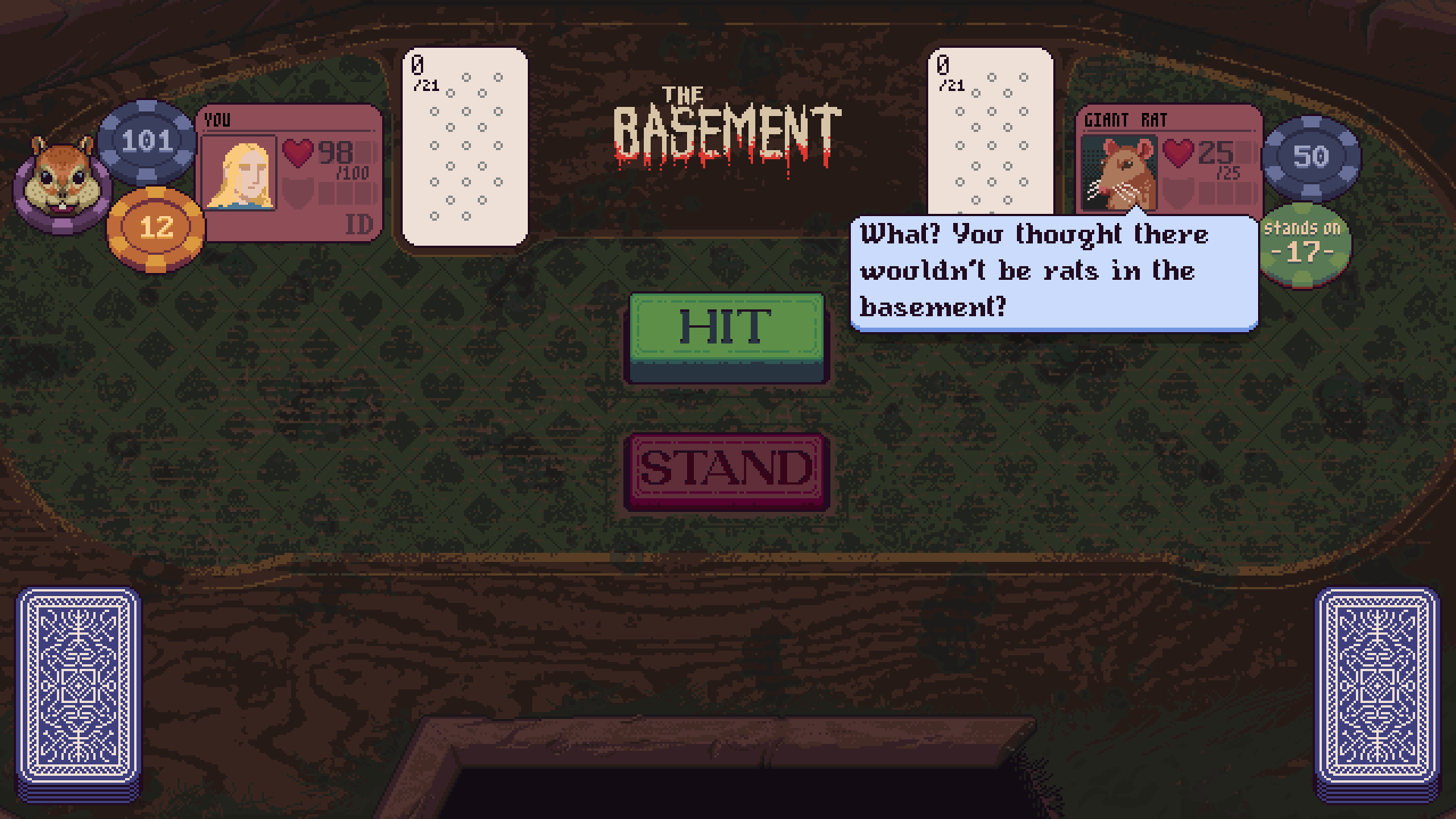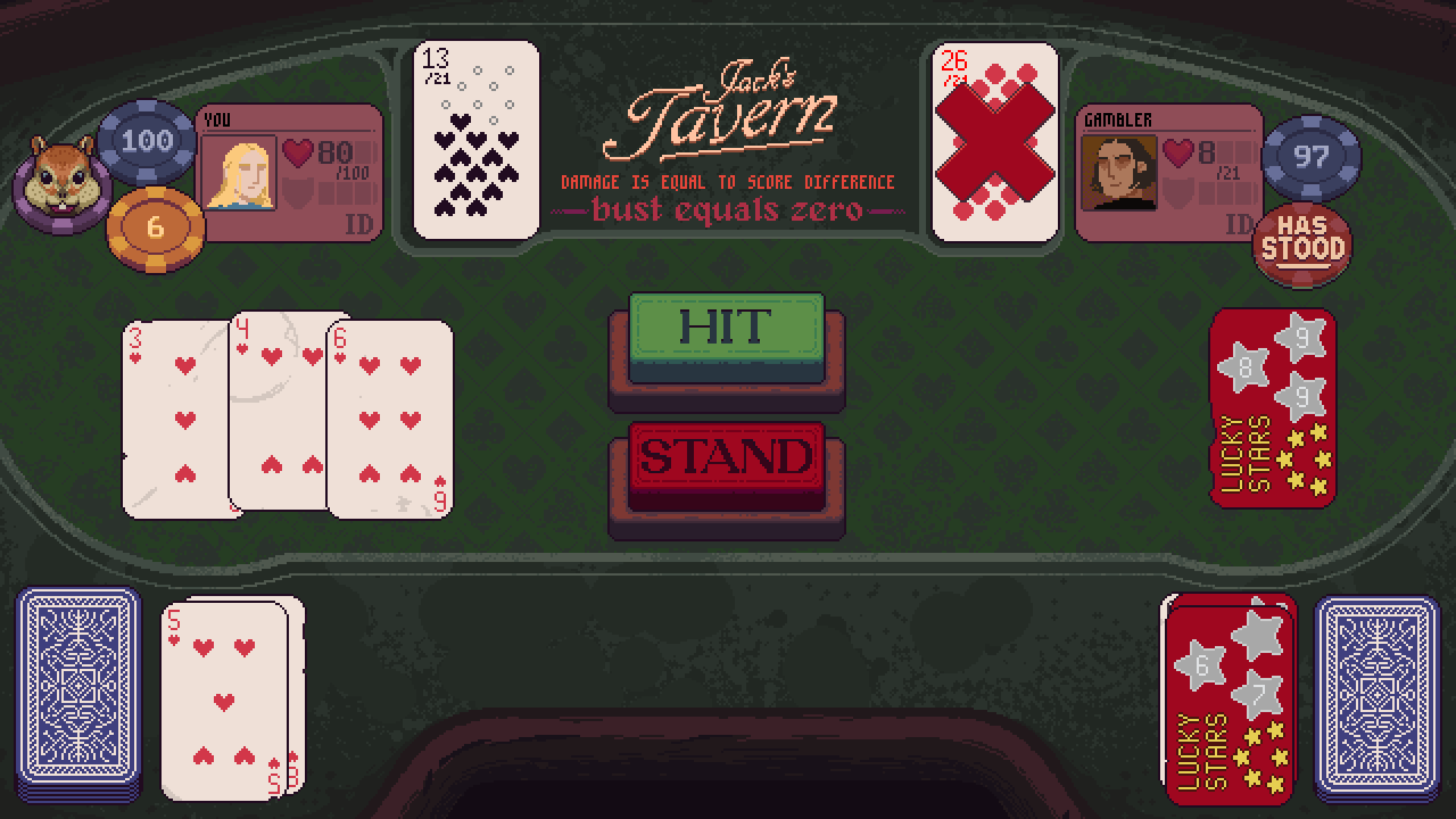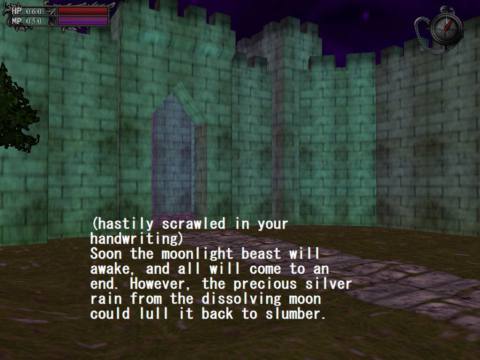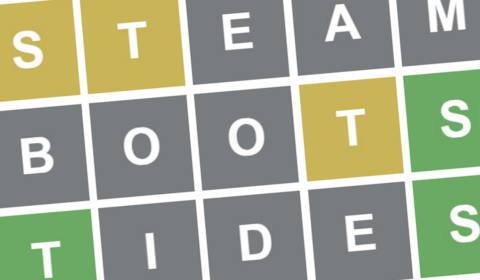What is it? A roguelike deckbuilder where you try to cheat at blackjack.
Release date August 8, 2024
Expect to pay $15/£12.80
Developer Purple Moss Collectors
Publisher Yogscast Games
Reviewed on ASUS ROG Ally
Steam Deck TBA
Link Official site
Game developers have clearly been spending a lot of time at the casino lately, and not just because they’ve been laid off by our wonderful, flawless industry. They’ve been taking casino classics, stripping out all that annoyingly life-ruining gambling, and transforming them into fun roguelike deckbuilders. Just this year we’ve had a smart new spin on roulette with Bingle Bingle, and ace poker riff Balatro might as well have deleted all the other games on my PC.
Now we have Dungeons and Degenerate Gamblers, a roguelike deckbuilder take on blackjack. It’s a game with its tongue so far in its cheek that it would be in danger of losing that tongue if someone were to punch it in the face. Unfortunate, given that this fun, clever card game is often face-punchingly frustrating. What’s the warranty on a Steam Deck that’s been thrown repeatedly at a wall?
If you’re a living saint who knows nothing about the sinful world of gambling, blackjack is a game wherein you and your opponent take turns drawing from individual decks of playing cards. You’re both trying to get a score that adds up to 21. Make a number that’s 22 or higher and you bust, meaning you’ll almost definitely lose, unless your opponent is courteous enough to bust too. So the trick is knowing when to quit. If you have an 18, is it really worth risking drawing another card?
D&DG’s first twist is that you have a consistent pool of 100 health to worry about, and every time you lose, you take the difference in score as damage. Say your opponent has hit 21 and you’re on 18. If you stick with that, you’ll take 3 damage. But if you risk drawing another card and bust you’ll take a massive 21 damage. Ouch!
You also can look at your draw pile and your opponents’ draw pile at any time, like the world’s greatest card counter. Get into the habit of doing this, as sometimes it provides a strong hint of your chances and other times outright confirms whether you’re going to win or bust.

That’s a decent system to build a roguelike deckbuilder around, and more interesting cards soon mix things up. Like one that lets you steal a card from your opponent, suddenly turning their winning 21 into a pathetic 11. Or one that deals three damage to yourself but gives you five points of shield against future attacks. Or the brilliant 0.5 card that only rounds up if you’re below 21 in your final score. That one has done so much for me that I’m leaving it everything in my will.
Charming presentation helps the learning curve go down easy. In an old tavern that “reeks of ale and addiction”, you start off playing drunks, janitors, and bards. Survive long enough and you can move up to the fancier floors, or descend into the dark and vile basement, where your first opponent is a literal rat. Later you explore a VIP area with crypto-shilling celebrities, and a head office where parts of your deck are laid off to protect the bosses bonuses. Brutal.
While a few more quips for each character wouldn’t have gone amiss, there’s still enough fun dialogue here to raise a smile, and some of the cards are sublimely silly. I’d love to see how long someone would survive playing blackjack in an actual casino with an SD card, a PS1 memory card, and a legally-just-distinct-enough-from-Pokémon card. Others cheekily reference Slay the Spire and Balatro, which is… brave. Do you really wanna risk inviting comparison to the best of the best?
This gambling house is also running every scam under the sun. There’s overpriced loot boxes, cryptocurrency you can buy and have to sell before the value plummets, a bored ape NFT card, roulette, slot machines, three card monte, etc. It’s pretty good at satirising most of this stuff while still keeping the game fair…
Joker in the pack

A proudly ridiculous game then, but play long enough and serious strategies do start to emerge. Chopping and changing your deck to make hitting that precious 21 easier is an obviously smart goal—filling mine with 10’s and 0.5 cards is going to work someday, dammit. There’s also plenty of nasty stuff for sabotaging your opponent, like a card that can burn one of their cards out of the game. Or a card that ‘locks’ one of their cards, forcing them to play it every hand. Cards like this become essential against the late-game opponents, something you learn through frustrating trial-and-error.
You have runs where the gambling gods smile down upon you and everything seems to go right. You then have runs where Satan seems to be dealing. But too often you have runs where the game just slows to a crawl.
Stalemates are very possible and incredibly tedious. At one point I managed to screw myself by burning my opponent’s deck until it contained only two cards: a pair of 10s. That meant they scored 20 every turn automatically, and the best I could do was chip away one damage at a time whenever I could get a perfect 21. That’s an extreme example, but far from the only way to trap yourself in a miserable battle that stretches on forever until you’re longing to turn the deck on yourself.

The game begins with four starter decks, each entirely one suit (hearts, spades, diamonds, or clubs), with different suits granting different bonuses when you get a 21. Hearts restore health, spades create shields, diamonds win you more chips, and clubs hit harder. Fine in theory, but because each starter deck is still the same set of basic numbers and face cards, they mostly play near-identically until you unlock a few more cards in a run. That means things get repetitive fast.
What makes things worse is that the health-restoring hearts deck is just so much more valuable than the other three options. Health is a nightmare to restore otherwise, relying on either the right card appearing in a run, incredibly stingy taverns, or some overpriced “loot boxes” that give you a card and restore a miserable 2 health apiece (ha ha ha I guess?). Beating an area boss with only three of my health points remaining should be exhilarating, but it isn’t when the first opponent in the next area easily picks me off.
Yet, despite all that moaning, I’ve sunk 20 hours into it so far. True, that’s because the tyrants who run PC Gamer force me to play the games before I review them, but I’m also going to dive back into it after my professional obligations. Because this feels a few patches away from being yet another deckbuilder great—and the developer has already announced that it’s got a balance update in the works to make the early going less punishing. But for now, each failed run ending with a reminder that “The House Always Wins” (ha ha ha) feels just a little too accurate.






